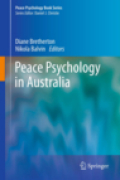
This book is a case study of the development of peace psychology in Australia. While there is, in comparison to other countries, relatively little overt violence, Australia the nation was founded on the dispossession of Indigenous people, and their oppression continues today. Peace Psychology in Australia covers the most significant issues of peace and conflict in the country. It beginswith a review of conflict resolution practices among Australia’s ancient Indigenous cultures and succinctly captures topics of peace and conflict which thecountry has faced in the past 222 years since British settlement. The fast population growth, thriving multiculturalism, leadership in international affairs and environmental isolation make Australia a microcosm for the study of human conflicts and peace movements. Addresses international relations and changes in the configuration of geopolitical power. Situates social relations and conflicts within Australian history to current issues in the country and to other nations. Contributors feature international pairing of seasoned scholars with early career peace psychologists, facilitating a dynamic dialogue in the field. INDICE: Introduction. Part I. The geohistorical context of peace psychology in Australia. - An overview of traditional forms of Indigenous conflict resolution and peace in Australia. Indigenous and 'settler' relationships, episodic, and structural violence. Immigration, multiculturalism and the changing face of Australia. A history of 'Psychologists for Peace' in Australia. National identity, Australian values and outsiders. Part II. Contemporary issues. Attitudes towards asylum seekers: The Australian experience. Battling boatloads of prejudice: An interdisciplinary approach to activism with asylum seekers and refugees in Australia. Enhancing relationships in school communities: Promotingcooperative conflict resolution and respect for cultural diversity in schools. Constructing masculinity: Understanding the connection between masculinity and violence. Having your say: Communication dynamics in effective mediation. Hidden obstacles to reconciliation in Australia: the persistence of stereotypes. On the promotion of positive peace for Indigenous Australians: ideas from across the Tasman. Australian peace psychologists at work: from theory to practice. Critical theory, community psychology, and community development in Indigenous empowerment. Part III. Future directions. Australia's relationship with the land: reckoning with climate chanage. A peacebuilding paradigm for peace psychology. A research agenda for the future: new challenges for Peace Psychology in Australia. Conclusion: peace psychology concepts for the future.
- ISBN: 978-1-4614-1402-5
- Editorial: Springer New York
- Encuadernacion: Cartoné
- Páginas: 387
- Fecha Publicación: 28/02/2012
- Nº Volúmenes: 1
- Idioma: Inglés
